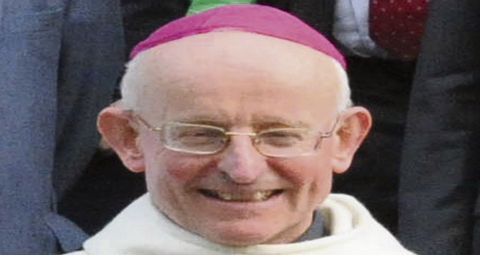September 11 | ![]() 0 COMMENTS
0 COMMENTS ![]() print
print

Abortion and Forgiveness: What is Pope Francis really saying?
By Bishop Hugh Gilbert
It was a surprise to see on the news recently that, during the forthcoming Year of Mercy, the Pope had given priests ‘permission to absolve from the sin of abortion’. Surely they had that already? But the impression given was that hitherto abortion had been a kind of unforgivable sin. Now, or at least during the Year of Mercy, it would be possible for those who had had an abortion to be absolved by the Church—a novelty not available before.
This is a reminder of how far we have to go in making our (sometimes complex) Catholic beliefs and practices known in the world of the media.
What did the Pope actually say? Here are his key words: “The forgiveness of God cannot be denied to one who has repented, especially when that person approaches the Sacrament of Confession with a sincere heart in order to obtain reconciliation with the Father. For this reason too, I have decided, notwithstanding anything to the contrary, to concede to all priests for the Jubilee Year the discretion to absolve of the sin of abortion those who have procured it and who, with contrite heart, seek forgiveness for it. May priests fulfil this great task by expressing words of genuine welcome combined with a reflection that explains the gravity of the sin committed, besides indicating a path of authentic conversion by which to obtain the true and generous forgiveness of the Father who renews all with his presence.”
Alongside this, we can set what the Church teaches in the Catechism of the Catholic Church: “There is no offense, however serious, that the Church cannot forgive. There is no one, however wicked and guilty, who may not confidently hope for [forgiveness], provided his repentance is honest. Christ who died for all desires that in his Church, the gates of forgiveness should always be open to anyone who turns away from sin.” (982).
The mercy of God is available always, everywhere and to everyone whose heart is turned to the Lord in sincere repentance. Such is the power of Christ’s Passion. The world always has a list of ‘unforgivable sins.’ Christ does not. The Church does not. Doesn’t, though, the New Testament mention an ‘unforgivable sin’ (Mt 12:31) – ‘blasphemy against the Holy Spirit?’ Yes, but that can only be our deliberate refusal to accept mercy and repent. It’s the hard-hearted and final rejection of God’s offer of salvation and grace.
So, as for other sins, so for abortion, the forgiveness of sins has always been available. It is available to the unBaptised through Baptism and to the Baptised normally through the Sacrament of Penance.
As a Psalm says, ‘It is He [the Lord] who forgives all your guilt, who heals every one of your ills, who redeems your life from the grave, who crowns you with love and compassion’ (Ps 102:3-4).
What then is the Pope referring to here? What is being offered in this Year of Mercy?
Here we need to distinguish two things:
— Absolution from sin;
—Remission of a censure.
In order to underline the seriousness of certain sins, Church Law can attach a canonical penalty to them. These are called censures. This means that if someone consciously and deliberately commits this particular sin, he or she not only offends God, and wounds the life of the Church, but also incurs what is called an ecclesiastical censure. Abortion is the taking of an innocent human life and therefore a violation of the fifth commandment.
It is a grave sin, as the Pope mentions. So, the Church has attached to it the censure of automatic excommunication (c1398). It is important to add that the censure is only incurred if the person is aware of its existence at the time of committing the sin (c1323/2).
In the early Church, the administration of penance was restricted to the bishop. Following that, even now the remission of a censure is reserved either to the local bishop or to the bishop of Rome, the Pope.
In the case of abortion, remission is reserved to the local bishop or his appointed delegate, known as the Canon Penitentiary. So, a penitent who is seeking reconciliation with God and the Church after an abortion requires both absolution from the sin and remission of the censure. Because of this, the matter often had to be referred to the bishop or his delegate, even after absolution had been granted by the priest (cf c 1357). What the Pope is saying is that, during the Year of Mercy, any priest can grant to a penitent who is truly contrite and seeks forgiveness both absolution from the sin of abortion and the remission of the censure, if it was incurred. He can act on behalf of the bishop. Many bishops have already granted this faculty to the priests of their dioceses. The Pope is granting it to all, as a sign for the Year of Mercy of the ‘true and generous forgiveness of the Father who renews all with his presence.’
— Bishop Gilbert is bishop of Aberdeen










